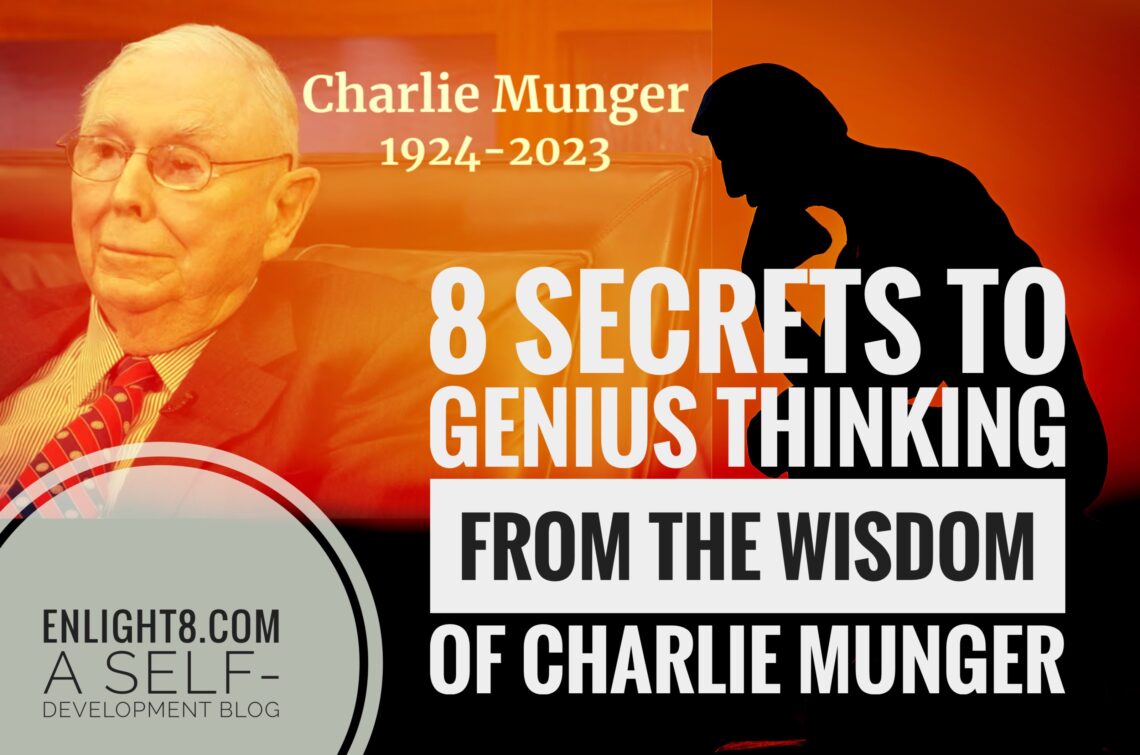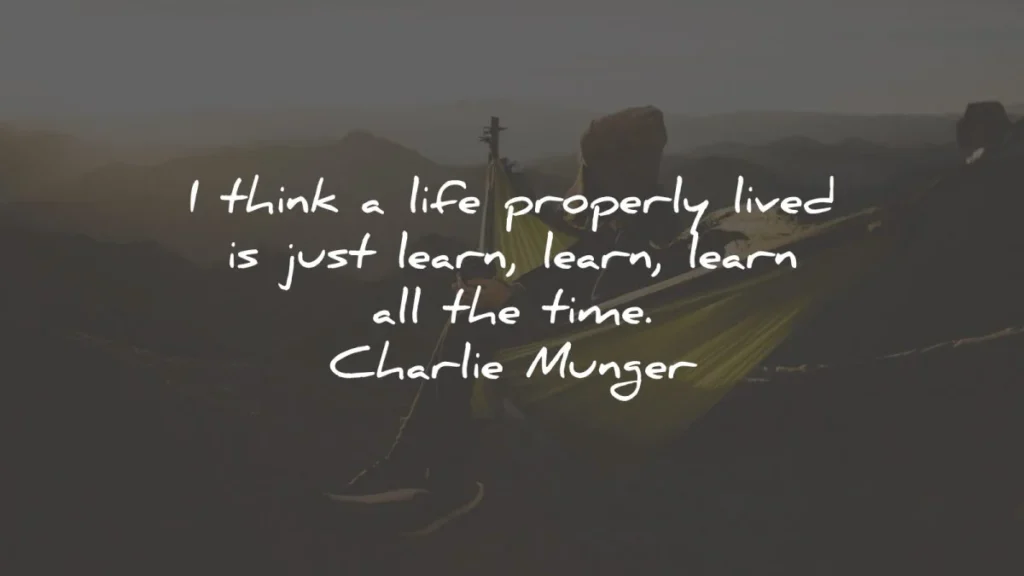
8 Secrets to Genius Thinking from the Wisdom of Charlie Munger
Charlie Munger is regarded as one of the greatest investors of the 20th century. As the Vice Chairman of Berkshire Hathaway, he collaborated with his renowned partner, Warren Buffett, to create an astonishing investment portfolio that has generated substantial wealth. Munger is modest and attributes his success to specific ways of thinking and mental models that have guided him throughout his life.
What makes Charlie’s mind so effective? What is the “bag of tricks” he relies on to analyze and assess businesses and investments, contributing to the success of Berkshire Hathaway and his investment portfolio?
“I was very lucky because everywhere I looked, at the pinnacle, there was someone better than I was… But I realized I would never be as good as those individuals. There was folly everywhere, and I came to understand that if I could just avoid that folly, I might gain an advantage without needing to excel in any one area. I kept following that approach throughout my life, and it worked so well that I enjoyed sharing it with others like you. It truly helps to tackle much of life by using inversion, where you turn the problem around and answer it from that perspective.”
Here are eight strategies to unlocking wisdom and think like Charlie Munger.
1. Invert, Always Invert (The Power of Inversion)

Charlie Munger, Warren Buffett’s business partner for many years, was really good at thinking in different ways. One of his most important ideas is the concept of “inversion.” This means that, instead of only thinking about how to succeed, you should also consider the opposite: what could cause you to fail.
For example, if you’re trying to do well on a test, you might initially think about how to study effectively, but using inversion, you’d also think about what could cause you to perform poorly. This might include not studying at all or being unprepared. By understanding these potential mistakes, you can take steps to avoid them and make better choices.
Inversion helps you see problems from a different angle. It forces you to think critically about your actions and their possible consequences. By identifying the pitfalls and challenges, you can plan for success more effectively.
So, next time you’re facing a tough decision or trying to achieve a goal, remember to ask yourself not just what steps you can take to succeed but also what missteps you need to avoid. This approach can help you become more thoughtful in planning your actions and ultimately lead to better outcomes.
2. Latticework of Mental Models
Charlie Munger has a unique way of thinking called the “Latticework of Mental Models.” This approach emphasizes the importance of learning from various fields, such as economics, psychology, physics, and history. Munger believes that gathering insights from different disciplines can improve our ability to make better decisions in life.
The idea behind the Latticework of Mental Models is that each discipline provides a different perspective on the world. For instance, economics can teach us about supply and demand, while psychology can help us understand why people behave the way they do. Physics can explain natural laws, and history can show us how past events shape our present and future. Combining these different viewpoints creates a “latticework” that allows us to analyze situations more thoroughly.
Using this approach, we can tackle problems more effectively. If we only rely on one way of thinking, we might miss essential factors or make poor choices. However, we become more well-rounded thinkers if we draw knowledge from many areas. This can lead to more precise insights and better solutions, whether we’re making decisions in business, education, or our everyday lives.
Charlie Munger encourages us to be curious and learn from various subjects. By doing so, we can build a strong foundation of knowledge that enhances our decision-making skills. The more perspectives we have, the better equipped we are to understand the complexities of the world around us.
3. Circle of Competence

Charlie Munger teaches us an important lesson about understanding our limits regarding knowledge. He introduced the idea of the “Circle of Competence,” which refers to the specific areas where you have significant knowledge and expertise.
Staying within your Circle of Competence means focusing on things you understand. For instance, if you have studied biology in school, you might feel comfortable discussing topics related to living organisms. On the other hand, if you know very little about coding or computer programming, it’s best not to make decisions or take risks in that area.
By concentrating on what you know well, you can make better choices and avoid mistakes when you venture into unfamiliar territory. For example, if someone who knows nothing about cars tries to fix a complicated engine issue, they might make things worse instead of better. However, a trained mechanic knows the ins and outs of car repairs and can confidently tackle the problem.
Staying within your Circle of Competence also helps you make more innovative investments or career choices. You’re more likely to succeed when you understand how a particular industry works or what makes a product valuable. If you were to invest in a technology company without knowing anything about the tech industry, you could risk losing money because you wouldn’t recognize warning signs that someone knowledgeable might see.
Charlie Munger’s concept encourages us to recognize our strengths and limitations. By focusing on areas where we have expertise and avoiding those where we lack knowledge, we can make better decisions, reduce risks, and ultimately achieve tremendous success in our personal and professional lives.
4. The Power of Incentives
Charlie Munger highlights a vital idea: people and organizations tend to act in ways that are influenced by the rewards or motivations they receive. These incentives can be financial, like money or bonuses, but they can also be psychological, relating to feelings of satisfaction, recognition, or fulfillment.
When we want to understand why someone or an organization behaves a certain way, we must consider what motivates them. For example, financial incentives (like commissions or bonuses) could drive workers to sell more if a company pushes its employees to meet sales targets. On the other hand, if employees feel appreciated and recognized for their efforts, the psychological incentive could encourage them to work harder because they want to feel valued.
This concept can be applied to many areas of life. In school, a student might study hard to get good grades because of the incentives of scholarships or parental approval. On a team, players might strive to win games not just for the trophy but for the camaraderie and recognition that comes with being part of a successful group.
Understanding the underlying incentives in any situation can help us predict behavior more accurately. By asking the question, “What’s the incentive driving this?” we can gain insights into motivations that might not be immediately obvious, which can guide us in making better personal and professional decisions.
5. Second-Order Thinking

Charlie Munger discusses one important concept: “second-order thinking.” This idea encourages us to look beyond immediate consequences when making decisions and consider the long-term effects of our actions.
For instance, imagine a company that quickly cuts costs to boost its profits. This is because it can lead to higher earnings in the short term. However, by cutting costs, the company might also reduce the quality of its products or services, which could frustrate customers. If customers start to leave because they aren’t satisfied, the company could find itself in a much worse situation down the road, possibly harming its reputation and profits in the long run.
Second-order thinking reminds us that every decision we make has ripple effects. When we act, we should ask ourselves, “What might happen after this?” or “What consequences could arise later?” This kind of thinking can help us make better choices that benefit us now and ensure a positive outcome in the future.
Being mindful of long-term impacts is crucial not just in business but also in our personal lives. For example, if a student decides to skip studying for an exam to hang out with friends, they might enjoy that time immediately. But if they don’t do well on the exam, it could lead to lower grades and affect their future opportunities.
Charlie Munger teaches us that by practicing second-order thinking, we can better anticipate the future implications of our choices and avoid adverse outcomes later on. It’s all about thinking ahead and understanding that our decisions today can shape our tomorrow.
6. Avoiding Cognitive Biases
Charlie Munger emphasizes the importance of avoiding cognitive biases in decision-making. Cognitive biases are systematic errors in thinking that can influence our judgments and decisions, often leading us astray without realizing it.
One common mental trap is confirmation bias. This way of thinking occurs when people seek information supporting their beliefs while ignoring evidence contradicting them. For example, if someone believes a particular investment is a good idea, they might only read articles that praise it and overlook any critical analysis. We must “think rationally” to be open to information that challenges our views.
Another critical cognitive bias is the sunk cost fallacy. This thinking occurs when individuals continue investing time, money, or effort into something just because they’ve already invested so much, regardless of whether it makes sense to continue. For example, if someone has spent a lot of money repairing an old car, they might keep putting more money into it rather than considering the cost of buying a new, more reliable vehicle. Realizing the sunk cost fallacy can help people make better decisions by focusing on the potential future benefits rather than past losses.
Finally, there’s the overconfidence bias, which occurs when people overestimate their knowledge or abilities. For instance, a person who has made successful investments might believe they can predict the market perfectly, leading them to take unnecessary risks. Recognizing these limits and remaining humble about what we truly know is essential.
By understanding and recognizing these cognitive biases, we can train ourselves to think more clearly and make more rational decisions. This awareness helps in investing and is beneficial in everyday life, allowing us to navigate challenges and opportunities more effectively.
7. Margin of Safety

Charlie Munger emphasizes the importance of having a “margin of safety” in decision-making, both in investing and in life. He means that it’s important to leave some room for potential mistakes or unexpected events.
In investing, the margin of safety comes into play when you buy something for less than what you believe it is truly worth—its intrinsic value. For example, if a company’s stock is worth $100 based on your analysis, but you can buy it for $80, you have a $20 margin of safety. This method means that even if things don’t go as planned or if new information comes to light that affects the company’s value, you have a cushion that protects your investment. It helps minimize the risk of losing money.
The concept of margin of safety applies in everyday life as well. It’s about being prepared for the worst-case scenarios. This way of thinking might mean having savings set aside for emergencies, studying for a test to ensure you do well even if some questions are tricky, or having a backup plan if a significant event doesn’t go as expected. By thinking ahead and preparing for possible challenges, you can approach situations more confidently and with less fear.
Overall, the margin of safety is all about understanding that life can be unpredictable, and it’s wise to plan accordingly. By allowing for mistakes and uncertainties, you set yourself up for better outcomes, whether in your financial investments or daily life choices.
8. Patience and Long-Term Thinking

Charlie Munger often shares wise insights about patience and long-term thinking. He emphasizes the importance of compounding—a concept that can greatly benefit anyone looking to build wealth or improve their life over time.
Compounding is like a snowball effect. When you invest wisely, your money earns interest, and then that interest also earns interest. Over time, this can lead to significant growth. Munger argues that instead of focusing on quick wins or trying to make a fast buck in the stock market, one should think in decades rather than months.
Rather than rushing to grab the latest investment trend or chasing immediate success, waiting for the right opportunities is smarter. Munger believes patience is a virtue, and those willing to bide their time and stick to their long-term plans often succeed.
By thinking long-term, you’re setting yourself up for financial success and personal growth. It’s about making thoughtful decisions today that will benefit you in the coming years rather than getting caught up in the moment and making hasty choices. So, the next time you feel tempted to jump at a quick opportunity, remember Munger’s advice: good things take time, and often, waiting is the best strategy.
By applying these mental models, you can make better investing, business, and life decisions.




